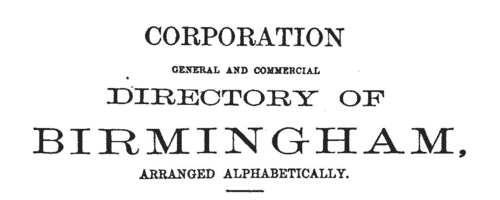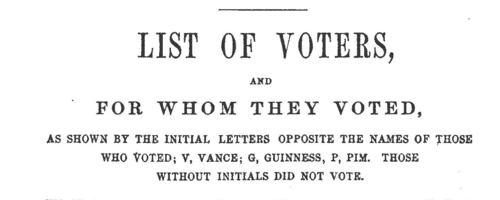Regan Surname Ancestry ResultsOur indexes 1000-1999 include entries for the spelling 'regan'. In the period you have requested, we have the following 262 records (displaying 71 to 80): Single Surname Subscription | | | Buying all 262 results of this search individually would cost £1,608.00. But you can have free access to all 262 records for a year, to view, to save and print, for £100. Save £1,508.00. More... |
These sample scans are from the original record. You will get scans of the full pages or articles where the surname you searched for has been found. Your web browser may prevent the sample windows from opening; in this case please change your browser settings to allow pop-up windows from this site.  Sailors and marines on board Her Majesty's ship Esk
(1856-1860) Sailors and marines on board Her Majesty's ship Esk
(1856-1860)
The China Medal was awarded to soldiers and sailors involved in the various actions of the war against China, in which this ship was engaged from 1856 to 1860. The medals were either delivered on board or sent on in 1862: except that many of the men were no longer immediately traceable, and the remarks on the roll show that some medals were not sent on for several years, and some were never sent. After the main roll there is a section showing which of the men also qualified for clasps. Separate clasps were awarded for men who had been in receipt of the China Medal of 1842; for the taking of Fatshan in 1857, Canton in 1857, Taku Forts in 1858, Taku Forts in 1860, and Pekin in 1860. Most of the men on this ship are shown as having been given the Canton clasp, for being actually present at Canton on 28 and 29 December 1857, when that city was bombarded and finally captured.REGAN. Cost: £8.00.  | Sample scan, click to enlarge

| Unclaimed Naval Prize Money from the China War
(1856-1860)
Various prize moneys were awarded to officers and men who served on board her Majesty's ships on the China Station during the war of 1856 to 1880. Firstly, there was a parliamentary grant of one month's pay to those serving on the Acorn*, Actaeon*, Adventure, Algerine*, Amethyst, Assistance*, Banterer*, Barracouta, Belleisle, Bustard, Calcutta*, Camilla, Clown*, Comus, Cormorant, Cruiser*, Drake*, Elk*, Encounter, Esk*, Firm*, Forester*, Furious*, Fury, Haughty*, Hesper*, Highflyer*, Hornet*, Inflexible*, Janus*, Kestrel*, Lee*, Leven*, Melville, Minden, Nankin*, Niger*, Nimrod*, Opossum*, Pique, Plover*, Princess Charlotte, Racehorse*, Raleigh, Sampson*, Sans Pareil*, Slaney*, Spartan, Starling*, Staunch*, Surprise*, Sybille*, Tribune, Volcano*, Watchful*, Winchester, and Woodcock*; in addition Canton booty was awarded to those serving on the ships asterisked (plus the Bittern and Coromandel tenders) at Canton on 28 and 29 December 1857, when that city was bombarded and captured. Then those on board the Bustard, Cruiser, Esk, Forester, Haughty, Highflyer, Lee, Niger, Nimrod, Sampson, Surprise, and the boats of the Elk, were rewarded for the captures of junks for breach of blockade of Canton River between 29 August and 19 December 1857. Other captures made by her Majesty's ships led to various other awards distributed between 1 January 1855 and 19 February 1863. Nevertheless, for one reason or another a substantial number of these prizes, from as little as 1s 7d to as much as £28, remained undistributed by 1902, when this comprehensive list of the unclaimed moneys was printed. In each case the sailor's name is given first (surname, then christian name or initials); rank or rating; ship in which serving at time of capture or award; parliamentary award; Canton booty; captures for breach of blockade of Canton River; other captures; and then the total.REGAN. Cost: £6.00.  | Sample scan, click to enlarge

|  British infantry fighting in China
(1860) British infantry fighting in China
(1860)
The China Medal was awarded to soldiers and sailors who took part in the prosecution of the war against the Chinese from 1856 to 1860. Separate clasps were awarded for men who had been in receipt of the China Medal of 1842; for being actually present at Canton on 28 and 29 December 1857, when that city was bombarded and finally captured; for being actually engaged in the operations which ceased with the first capture of the Taku Forts, 20 May 1858, and led to the Treaty of Tientsin; for being actually present at the capture of the Taku Forts 21 August 1860; and for being actually present before Pekin the day the gate of that city was given up to the allied (British and French) army, viz. on 13 October 1860. The 1st battalion, the 2nd (The Queen's Royal) Regiment of Foot, based at Walmer, embarked for the Cape of Good Hope 24 June 1851. The battalion took part in the capture of the Taku Forts and in that of Pekin.REGAN. Cost: £8.00.  | Sample scan, click to enlarge

|  British infantry fighting in China
(1860) British infantry fighting in China
(1860)
The China Medal was awarded to soldiers and sailors who took part in the prosecution of the war against the Chinese from 1856 to 1860. Separate clasps were awarded for men who had been in receipt of the China Medal of 1842; for being actually present at Canton on 28 and 29 December 1857, when that city was bombarded and finally captured; for being actually engaged in the operations which ceased with the first capture of the Taku Forts, 20 May 1858, and led to the Treaty of Tientsin; for being actually present at the capture of the Taku Forts 21 August 1860; and for being actually present before Pekin the day the gate of that city was given up to the allied (British and French) army, viz. on 13 October 1860. The 99th (Lanarkshire) Regiment of Foot, based at Cork, embarked for India in September 1858, and was transferred to China in 1860; moved to South Africa in 1865, and returned to England in 1869. The regiment took part in the capture of Pekin.REGAN. Cost: £8.00.  | Sample scan, click to enlarge

|  British riflemen fighting in China
(1860) British riflemen fighting in China
(1860)
The China Medal was awarded to soldiers and sailors who took part in the prosecution of the war against the Chinese from 1856 to 1860. Separate clasps were awarded for men who had been in receipt of the China Medal of 1842; for being actually present at Canton on 28 and 29 December 1857, when that city was bombarded and finally captured; for being actually engaged in the operations which ceased with the first capture of the Taku Forts, 20 May 1858, and led to the Treaty of Tientsin; for being actually present at the capture of the Taku Forts 21 August 1860; and for being actually present before Pekin the day the gate of that city was given up to the allied (British and French) army, viz. on 13 October 1860. The 2nd battalion, the 60th (The King's Royal Rifle Corps) Regiment, based in Winchester, embarked for the Cape of Good Hope in June 1851, and after taking part in the Kaffir War, was moved to India, where it helped deal with the Mutiny. In 1860 the battalion was transferred to China. The regiment took part in the capture of the Taku Forts and that of Pekin.REGAN. Cost: £8.00.  | Sample scan, click to enlarge

| Long-stay Paupers in Workhouses: St Marylebone
(1861)
This comprehensive return by the Poor Law Board for England and Wales in July 1861 revealed that of the 67,800 paupers aged 16 or over, exclusive of vagrants, then in the Board's workhouses, 14,216 (6,569 men, 7,647 women) had been inmates for a continuous period of five years and upwards. The return lists all these long-stay inmates from each of the 626 workhouses that had been existence for five years and more, giving full name; the amount of time that each had been in the workhouse (years and months); the reason assigned why the pauper in each case was unable to sustain himself or herself; and whether or not the pauper had been brought up in a district or workhouse school (very few had). The commonest reasons given for this long stay in the workhouse were: old age and infirm (3,331); infirm (2,565); idiot (1,565); weak mind (1,026); imbecile (997); and illness (493). REGAN. Cost: £6.00.  | Sample scan, click to enlarge

| Residents and Traders in Birmingham
(1861)
William Cornish's Corporation General and Trades Directory covered Birmingham, Coventry and the towns of the Black Country. The Birmingham section contains both street lists and this general alphabetical directory. REGAN. Cost: £4.00.  | Sample scan, click to enlarge

| Victoria Intestates
(1862)
The probate courts of the Australian colonies furnished returns of estates of deceased intestates, giving full name, colonial residence, supposed British or foreign residence of family (often unknown, or left blank), amount of the estate and how much had been disbursed and how. The date of death is often stated, and if by accident, suicide or crime. Names were carried forward from return to return until the estate was expended or exhausted. REGAN. Cost: £6.00.  | Sample scan, click to enlarge

| Dublin Electors
(1865)
This alphabetical list of electors for the City of Dublin for 1865 is annotated with details of the votes cast in the election of 15 July 1865 for a member of Parliament. The candidates were John Vance, Esq., D. L. (V), Benjamin Lee Guinness, Esq., D. L., LL. D. (G), and Jonathan Pim, Esq. (P). The first column gives, in bold, the initial of the ward in which lay the property that was the elector's qualification. The second column gives the elector's sequential number (alphabetically) within that ward. Then the elector's full name is given, surname first, and address, usually including house number. The votes cast are shown on the right: where these columns are blank, the elector did not vote. The key to the ward names is: A, South Dock; B, Donnybrook; C, Rathdown; D, Trinity; E, South City; F, Royal Exchange; G, Mansion House; H, Fitzwilliam; I, Wood Quay; K, Merchants' Quay; L, Usher's Quay; M, Arran Quay; N, Inns' Quay; O, North City; P, Rotundo; Q, Mountjoy; R; North Dock. S indicates the register of freemen.REGAN. Cost: £4.00.  | Sample scan, click to enlarge

| Patentees of New Inventions
(1867)
Abstracts of British patents for new inventions applied for and granted from 1 January to 31 December 1867: giving date, name and address, and short description of the invention. It is then stated whether 'Letters patent sealed' or 'Provisional protection only'.REGAN. Cost: £6.00.  | Sample scan, click to enlarge

|
Research your ancestry, family history, genealogy and one-name study by direct access to original records and archives indexed by surname.
|













